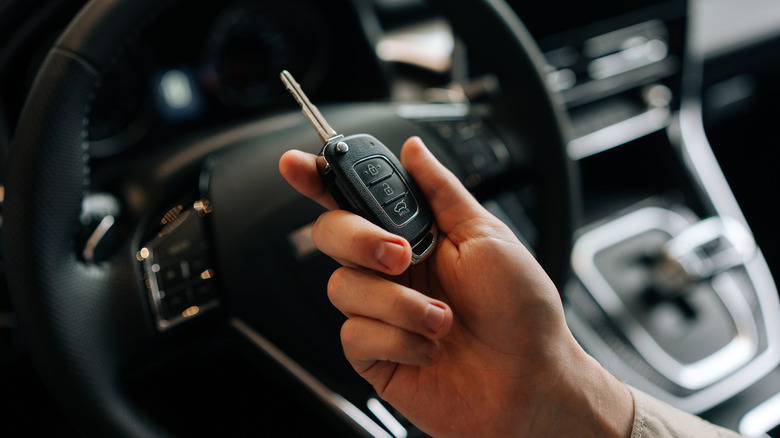You're Banned From Buying Cars On Sunday In These US States
In 1656, Thomas Kemble, a sea captain from Boston, got in trouble for kissing his wife in public on a Sunday. He'd probably think we have it easy today if all we need to do to avoid trouble on the Lord's day is skip buying a car. Kemble was a victim of the Blue Laws, rules steeped in religious traditions that marked Sunday as a day for rest and reflection.
First set up in colonial times, these laws aimed to keep Sundays sacred, limiting activities to ensure the day stayed centered on spiritual and family values. Initially, Blue Laws regulated many aspects of daily life, from prohibiting work to limiting the sale of specific goods. Over time, as cultural and societal norms evolved, many of these laws were repealed. However, the car sales industry remains affected.
Currently, 12 states in the U.S. continue to enforce laws that prohibit the sale of cars on Sundays. Today, the practice isn't just about keeping religious traditions; it also helps car dealers. They favor Sunday closures because it guarantees their employees a day off without falling behind the competition. These bans are among the few remaining Blue Laws that still shape modern business practices. So, push off buying a car until Monday, and it will give you time to review and remember the things you should never say when buying a car.
States with full or partial bans
Twelve states still maintain full bans on Sunday car sales. These include: Colorado, Illinois, Indiana, Iowa, Louisiana, Maine, Minnesota, Missouri, New Jersey, North Dakota, Oklahoma, and Wisconsin. Colorado enforces its ban through the Colorado Revised Statutes, which prohibits motor vehicle sales on Sundays. Meanwhile, some states have partial restrictions — limiting the hours during which car dealerships can operate on Sundays, rather than a full ban on sales. These are Maryland, Michigan, Nevada, North Dakota, Rhode Island, Texas, and Utah. It offers more flexibility to car dealers while still maintaining limits. Under Texas law, it is mandated that dealerships must close one day each weekend, allowing business owners choose either Saturday or Sunday as their non-operational day.
This approach also balances the legislative intent of providing a day of rest with the needs of the car sales industry. Utah employs a similar rule, where businesses must select one of the two days for closure but cannot remain open both on Saturdays and Sundays. These laws are not enforced across the country, leaving many states without such restrictions. However, the existence of both full and partial bans demonstrates how localized governance can affect the values and priorities of individual communities. Whether driven by tradition, economic lobbying, or practical considerations for workers, these laws have managed to persist, like the law of demand and supply or the reason it's so hard to tax the rich.
Effect of Sunday car sales bans
Some believe these bans are essential, providing a universal day off for dealership employees and honoring the original purpose of Blue Laws. Others argue that they slow down our quick, convenience-oriented market. However, one standout reason is clear: these rules benefit dealership workers. By mandating closures, states ensure these employees get a consistent day off in an otherwise cutthroat industry.
This built-in break helps maintain a work-life balance without the worry of losing customers to competitors, a luxury not afforded in many other sectors. Another reason comes from practical issues. Since banks are usually closed on Sundays, car sales involving loans or financing can't be wrapped up that day anyway. By keeping car dealerships closed on Sundays, states dodge these snags and make buying and selling cars smoother on the other days.
Dealers also gain from these restrictions. A mandated closure day cuts overhead costs. Without it, dealerships might feel compelled to open seven days a week to compete, increasing expenses and lowering employee satisfaction. Despite scrutiny, Sunday car sales bans persist because of the clear benefits they provide to stakeholders in the car sales industry. Whenever you step out to buy a car, so far it is not Sunday, look out for these five luxury cars actually worth your money, according to Kelley Blue Book.


